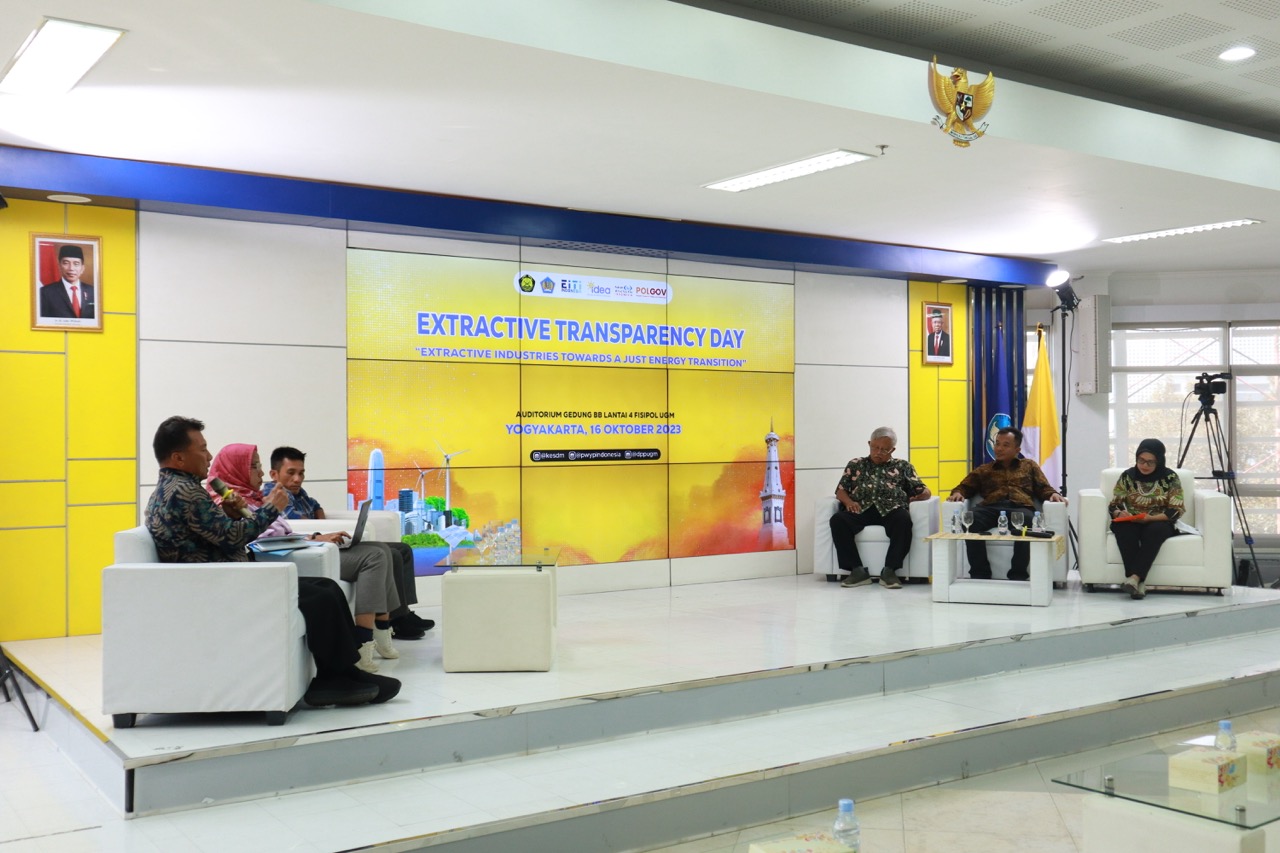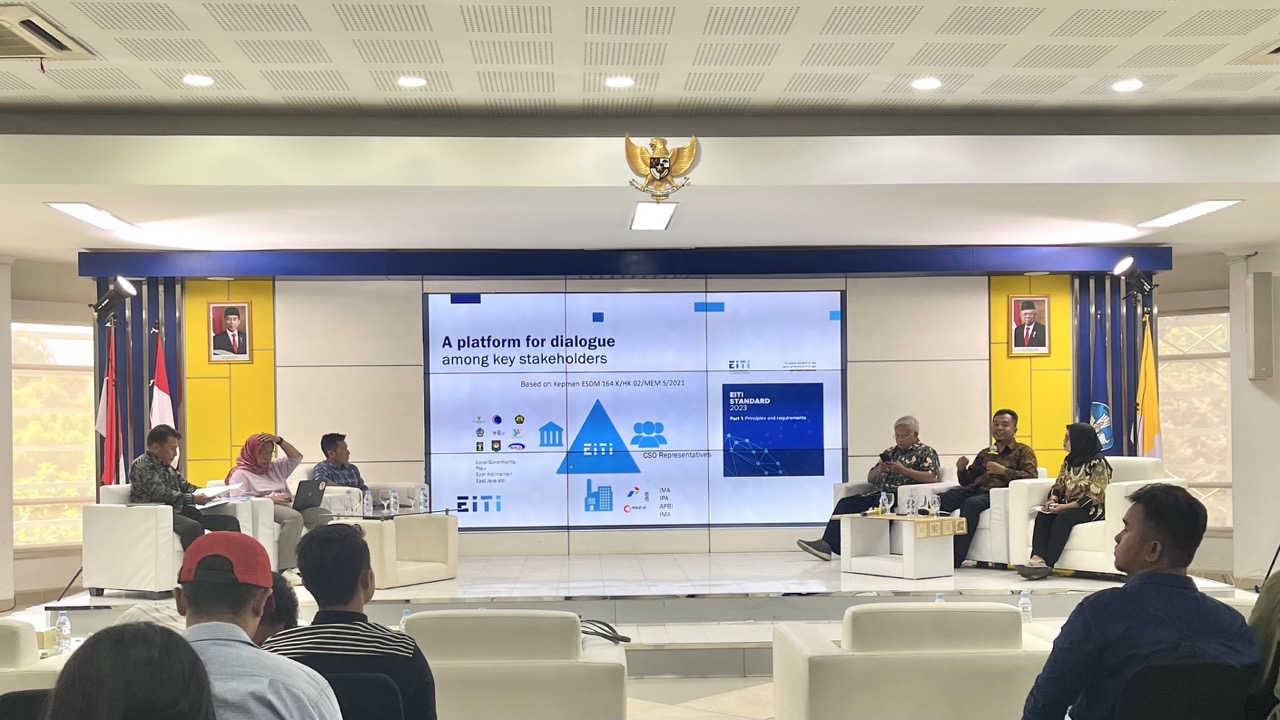Yogyakarta – Publish What You Pay (PWYP) Indonesia held a dissemination of the study of the Community Involvement program in the Just Energy Transition through the Implementation of Indonesia’s Extractive Industries Transparency Initiatives (EITI) in a series of Extractive Transparency Day on Monday, October 16, 2023 at the Auditorium of the Faculty of Social and Political Sciences, Gadjah Mada University, AB Building 4th floor, Jalan Sosio Yustisia, Bulaksumur. Extractive Transparency Day is an activity organized by PWYP Indonesia; Ideas and Analyses Indonesia (IDEA) Yogyakarta, and Research Center for Politics and Government (PolGov), Department of Politics and Government (DPP) Faculty of Social and Political Sciences (FISIPOL), Universitas Gadjah Mada (UGM); in collaboration with the Ministry of Energy and Mineral Resources (ESDM), as the Secretariat of EITI Indonesia with the theme “Contextualizing Transparency of Extractive Industry Data and Information in the Framework of Just Energy Transition.”
 The dissemination was carried out in an interactive discussion format guided by moderator Tenti Novari Kurniawati, Executive Director of IDEA Yogyakarta, and presented several respondents including Sigit from the North Morowali Regency Environment Office; Mohammad Arif, community representative from Towara Village, North Morowali Regency; Djoko Widajatno, Executive Director of the Indonesia Mining Association (IMA); Amalinda Savirani, PhD, DPP Fisipol UGM Lecturer. The study’s presenter is the National Coordinator of PWYP Indonesia, Aryanto Nugroho.
The dissemination was carried out in an interactive discussion format guided by moderator Tenti Novari Kurniawati, Executive Director of IDEA Yogyakarta, and presented several respondents including Sigit from the North Morowali Regency Environment Office; Mohammad Arif, community representative from Towara Village, North Morowali Regency; Djoko Widajatno, Executive Director of the Indonesia Mining Association (IMA); Amalinda Savirani, PhD, DPP Fisipol UGM Lecturer. The study’s presenter is the National Coordinator of PWYP Indonesia, Aryanto Nugroho.
The study prepared by PWYP Indonesia and IDEA Yogyakarta with the support of the International EITI Secretariat aims to enable civil society and local communities, especially those in North Morowali Regency located in Central Sulawesi, to have a better understanding of the impact of the energy transition on the extractive sector and their livelihoods, primarily related to local revenues from ongoing and planned projects, based on data disclosed by EITI Indonesia; EITI Indonesia MSGs with a better understanding of local communities needs, opportunities and possible risks around the energy transition through sub-national level reporting – based on community case studies in Morowali District; and Local communities with opportunities to engage EITI Indonesia MSG platforms to amplify community voices for improved energy and natural resource governance.
 Aryanto, in his presentation, mentioned several findings from the study that directly involved the people of Tiu and Maralee villages (including from Bungintimbe, Molores, and Towara villages who joined later) in a series of activities, including, “First, related to access to information related to energy transition and its impacts, the people in these villages only understand that the rampant exploitation of nickel mining and the growth of the smelter industry in North Morowali, is used for raw materials for battery products. Communities around the mine also do not know much about various regulations and policies related to mining management since the pre-mining period, during mining activities, and post-mining.”
Aryanto, in his presentation, mentioned several findings from the study that directly involved the people of Tiu and Maralee villages (including from Bungintimbe, Molores, and Towara villages who joined later) in a series of activities, including, “First, related to access to information related to energy transition and its impacts, the people in these villages only understand that the rampant exploitation of nickel mining and the growth of the smelter industry in North Morowali, is used for raw materials for battery products. Communities around the mine also do not know much about various regulations and policies related to mining management since the pre-mining period, during mining activities, and post-mining.”
“Second, related to utilization and information for the community, based on discussions with the community regarding how to improve transparency and governance of mining activities, the community proposes that socialization and explanation of the rules underlying mining activities be carried out so that they can be used as guidelines for the community in supervising mining activities in their area; There needs to be an explanation of the relationship between the Village Budget (APBDES) and the implementation of the Mineral and Coal Revenue Sharing Fund (DBH) for the Village; There needs to be clarity regarding environmental permits and what are the company’s responsibilities to the environment and how they are implemented, especially in monitoring the environmental impact of mining activities.”
“Third, the importance of building EITI at the local level. None of the communities in these villages know about the EITI initiative and what data and information are produced by the EITI. Although people at the community level have yet to learn about EITI, the community seems very enthusiastic about supporting it after receiving an explanation from the study implementation team. The community has high hopes that the problems of mining impacts that currently threaten the Lake Tiu ecosystem, which is a source of water, livelihood, and livelihood/food for the community, can be resolved, especially through mediation through a multi-stakeholder forum.”
In her response, Amalinda Savirani, PhD, Lecturer of DPP Fisipol UGM, began with a fundamental question: “Can community engagement contribute to a just energy transition?“. In the context of this study, Linda conveyed important notes that for community involvement to be more meaningful, it must find its relevance to data and information or the EITI process itself. For example, extractive industry transparency must be able to address poverty and inequality. Is the data and information published relevant and usable? Need to strengthen the role of local and village governments. And need encouragement to integrate existing channels, especially those close to the community.
Author: Aryanto Nugroho